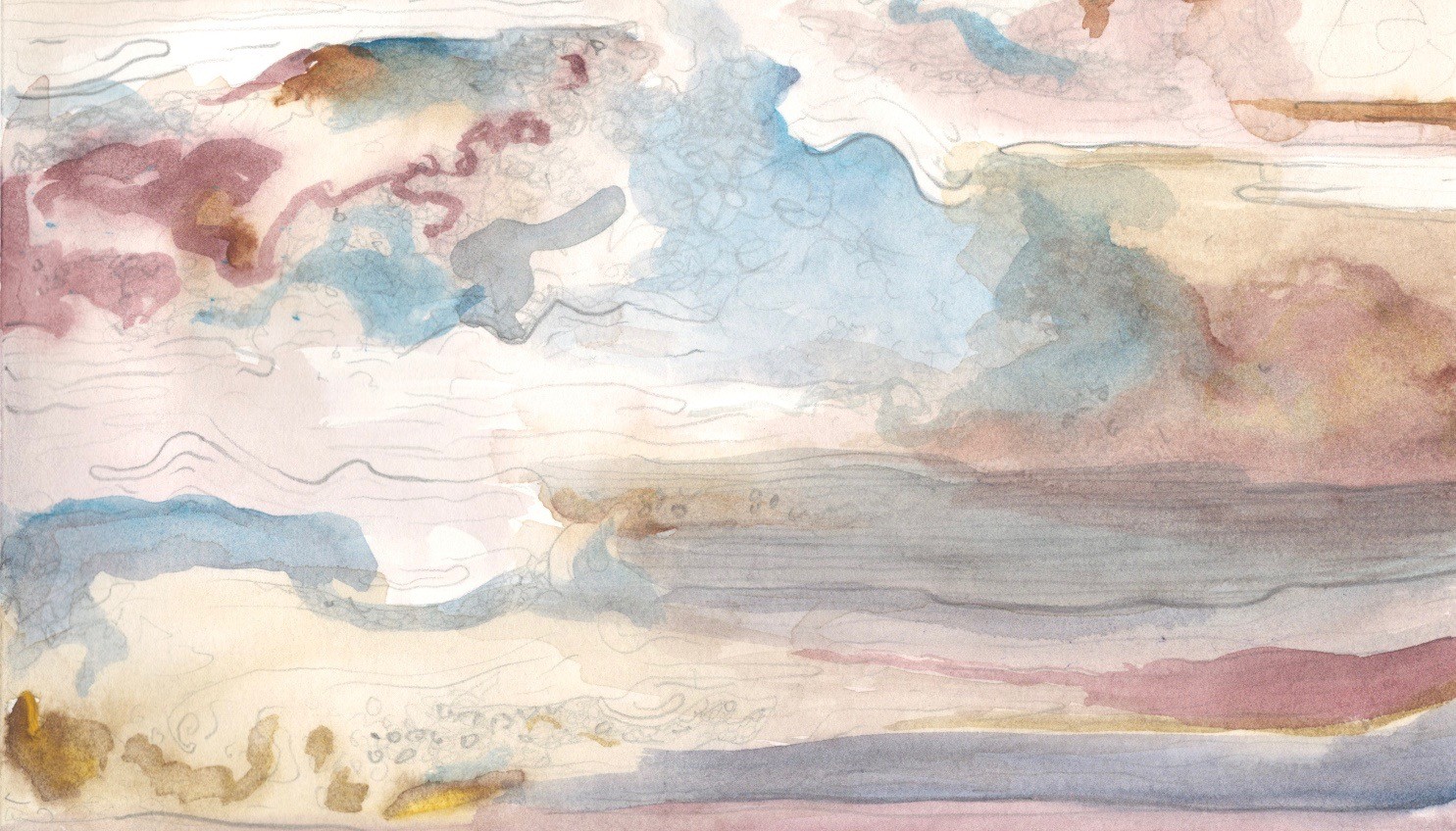Entanglement
“Arriving in Tucson in the summer of 2017 to research the pollution I had long understood to have caused my own disability, I recognized intimately just how utterly entangled this mass disablement of nature is with the disablement of human beings.” So begins Sunaura Taylor’s Disabled Ecologies: Lessons from a Wounded Desert, published by UC Press in 2024. Taylor, Assistant Professor in the Department of Environmental Science, Policy and Management at UC Berkeley and the director of Berkeley’s Disabled Ecologies Lab, goes on to explore the pollution of the ancient aquifer in the Sonoran desert, part of a “disabled ecology” of “relationships and entanglements that are rooted deep in the desert’s aquifer.” In the watercolor renderings of the aquifer that accompany her book, pigment washes mingle in the weave of the paper, enacting the subterranean movement and entangled emergence of water and meaning, figure and ground, in both the Arizona landscape and its manifestation on the page.
Caught in a web, tied up in knots, tangled up in blue: entanglement conjures difficult situations, hard feelings, and terminal relationships (“It’s complicated”). Yet entanglement is also the starting point for new thinking and creative work. Art and humanity are entangled from their earliest origins, argues Alva Noë (Philosophy, UC Berkeley) in his 2022 book The Entanglement: How Art and Philosophy Make Us Who We Are. “The things we know best, that make us what we are—our mental powers and personalities—are made up by art, or by art and philosophy,” writes Noë. “We ourselves, then, are the very stuff of art. We are living in the entanglement.”
In science studies, entanglement has emerged as a key metaphor for scientific inquiry, as in the genotype-environment entanglement disclosed by feminist philosopher of science Evelyn Fox Keller in her work on the models, metaphors, and machines that guide biological research. In quantum physics, neuroscience, and art and design, among other fields, entanglement conceptualizes the interweaving and mutual constitution of earth systems, biological processes, and cultural forces.
In the humanities, entanglement captures the confluences and complicities among embodiment, environment, language, history, and power that shape the worlds we live in and the stories we tell. Entanglement is organic, self-organizing, and ubiquitous. Because entanglement engages so many systems, it requires humanistic forms of attention and analysis to follow the threads of causation through a dense and fibrous labyrinth that is itself a complex web of relationships.
Following the trail of entanglements great and small in order to better understand both the human condition and our planetary predicament, UCHRI and the UC Humanities Network will host a series of events and curate faculty and graduate student projects and resources on the intrication of cultural, political, and environmental factors across time and space and the role of art and interpretation in both visualizing the many webs of social and natural connection and bringing fresh clarity and new perspectives to their composition and effects.
Entanglement calls to mind the following questions and projects:
- The interaction of multiple systems and orders of meaning in “wicked problems” such as climate change, homelessness, healthcare, and incarceration
- The knotting of different historical periods, styles, scales, audiences, and temporalities in works of art
- The entangling of the humanities with other disciplines
- Intersecting and intersectional causalities in feminist, Black, Indigenous, ethnic, gender, and disability studies
- The entanglement of AI with human labor, energy consumption, racialized capital, and other material forces
- Entanglement in and between speculative fiction and STEM research
- Multispecies entanglements
- Households, classrooms, communities, and other environments of care as sites of complexity
- Entanglement, intimacy, and attachment in the dispositions and arrangements of gender and sexuality
- Entangled life in global religious and philosophical traditions
- Transformations of the human through corporeal realities, discourses of power, racialized assemblages, embodied relations, and the more-than-human
UCHRI looks forward to exploring these and other issues with colleagues and students in the UC system in 2024-25. Explore our open calls and apply to contribute to this intricate web of projects.
Image credit: “Speculative Aquifer as Flows” by Sunaura Taylor.
Events & Resources
UC Merced |
Saturday, September 14, 2024, 2-3 pm: Entanglements at Merced LitFest with Christina Lux, Shiraz Noorani, and David Toh Kusi (UCM)
Location: Second Time Around Books
UC San Diego |
Wednesday, October 30, 2024, 11 am-12 pm: Reporting from the Gray Zone: Stories of Moral Complication, Confusion, and Compromise with Joshua Yaffa, in conversation with Alexei Yurchak (UCB) and Ainsley Morse (UCSD)
Location: Zoom
Monday, January 13, 2025, 11 am-12:30 pm: Arab Students, Dostoevskian Sacrifice, and the Russian Girlfriend Fantasy with Margaret Litvin (Boston University)
Watch the recording
UCHRI |
Thursday, January 23 and Friday, January 24, 2025: Mapping New California Histories conference
Location: UC Irvine, Humanities Instructional Building 135
UC Riverside |
Friday, February 7, 2025: Entanglement: 2025 UC Graduate Student Virtual Conference
Location: Zoom
UC Santa Barbara |
Thursday, February 6, 2025, 4-6 pm: Antidotes to Ageism in the Anthropocene: Generational Time and Multispecies Literary Ethnography with Kathleen Woodward (University of Washington)
Location: UC Santa Barbara, HSSB 6020, McCune Conference Room
UC Santa Cruz |
Tuesday, March 11, 2025, 2-6:30 pm: Critical Imagination in Crisis Times with Iain Chambers (Oriental University, Naples), Paul Gilroy (University College, London), and Vron Ware (London School of Economics and Political Science)
Location: UC Santa Cruz, Cultural Center at Merrill & on Zoom

